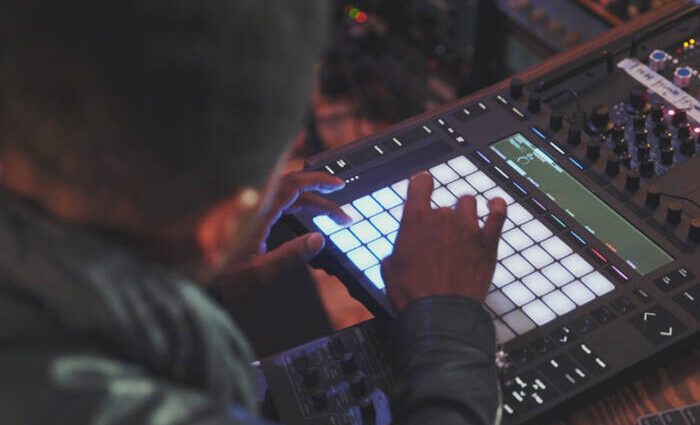
The world of hip-hop production has witnessed a significant shift in recent years with the rise of type beats. As an experienced hip-hop music producer, I’ve observed firsthand how this trend has evolved and shaped the beat-selling world, creating a new landscape for both producers and artists. Type beats are more than just a trend; they’ve revolutionized the way producers and artists collaborate, paving the way for a new era of hip-hop production.
What Are Type Instrumental Beats?
For those unfamiliar with the term, a type beat is an instrumental track that mimics the style of a specific artist or producer. These beats are labeled according to the artist or style they resemble, such as “Drake Type Beat” or “Travis Scott Type Beat.” This practice allows producers to showcase their ability to replicate the signature sounds of popular artists, while helping up-and-coming musicians find instrumentals that suit their style and artistic vision.
As Daniel Hartnett, the founder of The Corporatethief Beats, I’ve been producing type beats for over a decade, and type beats have become a core component of how I operate. When I first started The Corporatethief Beats in 2010, the music production landscape was different, and finding a beat that matched your unique style could be both challenging and costly. The advent
type beats have drastically simplified this process.
The Impact of Type Beats on Hip-Hop Production
1. Accessibility for Independent Artists
One of the most significant ways type beats have transformed hip-hop production is by democratizing access to high-quality instrumentals. Before the type beat phenomenon, independent artists had to either produce their own beats or work directly with producers, which often came with a hefty price tag. Now, platforms like BeatStars, Airbit, and The Corporatethief Beats provide a vast library of type beats for artists to choose from.
Type beats allow artists to quickly find the exact sound they’re looking for without the need to commission a custom beat. Whether an artist is searching for a “J. Cole type beat” with soulful samples or a “Migos type beat” with trap-heavy drums, they can find instrumentals that fit their needs and budget within minutes.
2. A Creative Shortcut for Artists
In today’s fast-paced music industry, speed and efficiency are essential. Type beats give artists a creative shortcut, allowing them to start writing and recording over a beat without spending weeks in search of the right sound. As a producer, I’ve seen countless artists use type beats to quickly lay down verses, refine their sound, and release music more frequently.
3. Increased Visibility for Producers
For producers like myself, type beats offer a unique opportunity to gain visibility. When I create a beat that emulates a particular artist’s style, it’s labeled accordingly and uploaded to platforms like YouTube or BeatStars. Aspiring rappers looking for a specific sound are likely to find it by searching for terms like “Drake type beat” or “Kendrick Lamar type beat.”
How Type Instrumentals Have Shaped the Beat-Selling Market?
Type beats have also had a profound impact on the way beats are sold online. Platforms like TryBuyBeats.com, Airbit, BeatStars, and my own site, The Corporatethief Beats, have been at the forefront of this revolution, creating a thriving marketplace where producers and artists can connect seamlessly.
1. Affordability and Simplicity
Before the rise of type beats, purchasing a beat could be a complex and expensive process. Producers often offered multiple licensing tiers, each with its own restrictions and pricing. Type beats, on the other hand, have simplified this system. Many producers now offer beat packs—collections of multiple beats at a discounted rate—making it more affordable for artists to obtain a wide variety of instrumentals.
At The Corporatethief Beats, for example, I offer beat packs that include up to 40 instrumentals for one low price, with a straightforward licensing agreement. This approach not only reduces confusion for the artist but also makes it easier for producers to sell their work in bulk.
2. The Rise of Non-Exclusive Licensing
Non-exclusive licensing has become a staple in the type beat market. This allows multiple artists to lease the same beat, significantly reducing costs for each individual buyer while maximizing earnings for the producer. While this might not appeal to artists looking for complete exclusivity, it’s an excellent option for those who want to release music on a budget.
Platforms like TryBuyBeats.com have taken this model even further, offering producers residual income opportunities and profit-sharing systems, ensuring that creators continue to earn from their beats long after the initial sale.
The Double-Edged Sword of Type Beats
While type beats have undoubtedly transformed hip-hop production for the better, they aren’t without their drawbacks. Some critics argue that type beats encourage a lack of originality, as artists gravitate toward familiar sounds rather than experimenting with new styles. This reliance on established trends could potentially stifle innovation in hip-hop, as producers and artists alike prioritize mimicry over creativity.
Conclusion
Type beats have revolutionized hip-hop production by making high-quality instrumentals more accessible, affordable, and tailored to specific sounds. As both a hip-hop producer and music marketer, I’ve witnessed the profound impact of type beats on the industry. They’ve opened up new opportunities for producers and artists alike, allowing for faster collaborations, increased visibility, and a more dynamic music marketplace.
© 2024, Logan. All rights reserved.
Source link

